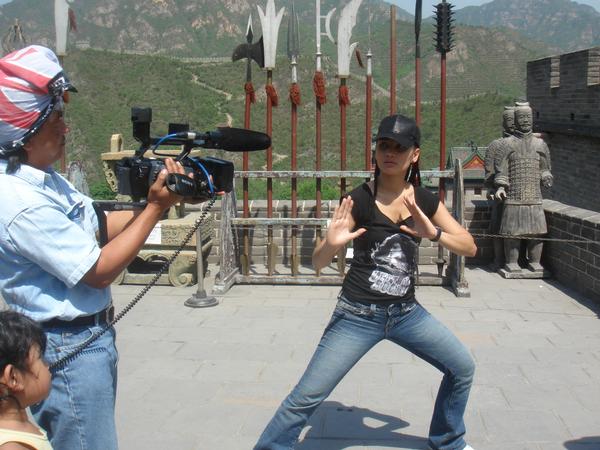

Obedience To The Ameer
(English rendering of the Urdu pamphlet "Ameer Ki Ita'at"
by the late Syed Masood Ahmad)
1) Allah the Exalted says: Oh those who believe obey Allah, obey the
messenger and those who hold authority amongst you. (Nisa-59)
From this blessed ayah obedience to Ulil Amar meaning those in
authority becomes obligatory. In this ayah there was no condition
placed for a government with those in authority so obedience to Ameer
is obligatory. To impose such a condition from one's own self is
amendment to Kitab Allah and that is kufr.
2) Messenger of Allah SallAllah-u-Alaihi-Wa-Sallam said: Whoever
obeys the Ameer he obeys me and whoever disobeys the Ameer he
disobeys me.
(Sahih Muslim Kitab ul Emiraate Vol. 2 pg 126)
From this hadith it is known that every Ameer's obedience is
obligatory. For obedience to the Ameer there is no condition. To impose
the condition for a government is manipulating the Shari'ah and that is
shirk.
3) Messenger of Allah SallAllah-u-Alaihi-Wa-Sallam said: Whoever
dislikes something of the Ameer then he should be patient as whoever
separates the size of a palm from the sultan then his death would be of
Jahiliyya.
(Sahih Bukhari Kitab ul Fiten Vol. 9 pg 59 and Sahih Muslim Kitab ul
Emiraate Vol.2 pg134)
Sultan means proof, evidence, authority and power.
Allah the Exalted says: And I sent Moosa with my signs and clear proof.
(Hud-96)
Allah the Exalted says: And whoever is unjustly killed then we give his
kin authorisation (that he take revenge) (Bani Israel-33)
Allah the Exalted says: Oh groups of Jinns and Humans if you can exit
the corners of the land and skies then do so (but) you can't exit
without power. (ArRehman-33)
In the above hadith's first part the word is Ameer and in the second
part the word is sultan which is used for Ameer. Ameer due to his post
in emirate has a kind of a power and as his order is the last say for his
subordinates that is why he is called sultan. A King is called sultan as
well as he has power in his hand and his say is the last for the
subordinates.
Hence every Ameer's obedience is obligatory and separation from his
obedience even the size of a palm is prohibited. Because of the Ameer
there is organization in the Jamaat and power grows in the
organization. If the Ameer is not obeyed then power would gradually
leave the organization. Ameer is the centre of power in the Jamaat and
because of his centrality he himself is a power and sultan.
4) Messenger of Allah SallAllah-u-Alaihi-Wa-Sallam said: Whoever
sees something distasteful in his Ameer then he should be patient as
whoever separates the size of a palm from the Jamaat and (in the same
condition) dies then his death would be the death of Jahiliyya.
(Sahih Bukhari Kitab ul Fiten Vol. 9 pg 56 and Sahih Muslim Kitab ul
Emiraate Vol. 2 pg 136)
Note: Jahiliyya means the time before Islam meaning the era of kufr.
In the first part of this hadith the word Ameer is there and in the
second part the word Jamaat is used meaning leaving the Ameer is
leaving the Jamaat.
5) Ebada bin Sabit says: The Prophet called us then took baiyah
from us. He took the baiyah from us on the following: To listen and
obey (Ameer's order), in pleasure or displeasure, in hardships and
easiness and when given preference and (we also took baiyah on) that
not to quarrel with the Ameer in his authority except when you see
(him doing) open kufr and (to prove his kufr) you have from Allah clear
proof.
(Sahih Bukhari Kitab ul Fiten Vol. 9 pg 59 and Sahih Muslim Kitab ul
Emiraate Vol. 2 pg 132)
6) Messenger of Allah SallAllah-u-Alaihi-Wa-Sallam said: Listen and
obey (Ameer's order) even if an Ethiopian slave is made (Ameer) on
you whose head is (the size of) a raisin.
(Sahih Bukhari Kitab ul Ehkaam Vol. 9 pg78)
7) Messenger of Allah SallAllah-u-Alaihi-Wa-Sallam said: Listening
and obeying (the Ameer' order) is compulsory on a Muslim whether he
likes it or dislikes it (the order) (with the condition) that he isn't
ordered to sin.
(Sahih Bukhari Kitab ul Ehkaam Vol. 9 pg 78 and Sahih Muslim Kitab ul
Emiraate Vol. 2 pg 131)
From this hadith it is known that Ameer's obedience is obligatory with
one condition that Ameer doesn't order to sin. For obedience to the
Ameer there is no condition for a government in the hadith.
8) Abdullah bin Omar says: When we use to do our baiyah with the
messenger SallAllah-u-Alaihi-Wa-Sallam on listening and obeying he
use to say to us: "As much as you can".
(Sahih Bukhari Kitab ul Ehkaam Vol. 9 pg 96 and Sahih Muslim Kitab ul
Emiraate, Vol. 2 pg 146)
9) Jareer says: I did baiyah with the messenger SallAllah-u-Alaihi-
Wa-Sallam on listening and obeying (the order) so he taught me (to
say) As much as I can (will listen and obey).
(Sahih Bukhari Kitab ul Ehkaam Vol. 9 pg 96)
From these ahadith the importance of Ameer's obedience is clear.
Baiyah use to be taken on Ameer's obedience.
10) Abu Zar says: Messenger of Allah (SallAllah-u-Alaihi-Wa-Sallam)
said: Abu Zar, I find that you are weak and I like for you what I like for
myself. Don't become Ameer of Jamaat ven over two persons.
(Sahih Muslim Kitab ul Emiraate Vol. 2 pg 124)
There can be only two forms for becoming Ameer over two persons:
1. The Khalifah appoints someone as Ameer over two people i.e.
Ameer of Jamaat Delegation.
2. In the absence of the Khalifah two persons appoint over
themselves someone as Ameer i.e. Ameer of Jamaat or Ameer in
travelling.
In both conditions to make one specific is without proof. In the second
form the Ameer of the two persons wouldn't have any government or
army but still his obedience would be obligatory. If it is not obligatory
then what is the duty from which it is being warned.
11) Messenger of Allah SallAllah-u-Alaihi-Wa-Sallam said: It is
obligatory for you to listen to the ruler and obey him in adversity and
prosperity, in pleasure and displeasure, and even when another person
is given (undue) preference over you.
(Sahih Muslim Kitab ul Emiraate Vol. 2 pg 130)
12) Messenger of Allah SallAllah-u-Alaihi-Wa-Sallam said: If a slave
who doesn't have a nose (such a slave) is appointed Ameer over you
and he leads you according to the Book of Allah then listen and obey
(to his orders).
(Sahih Muslim Kitab ul Emiraate Vol. 2 pg 131)
There can be two forms in making a slave an Ameer:
1. Any Khalifah appoints any slave as Ameer i.e. Local Ameer or
Ameer of troops etc.
2. With advice people make someone Ameer themselves i.e. Khalifah
or Ameer of Jamaat; in both forms the obedience of the slave would be
obligatory
13) Abu Zar said: My friend (Prophet SallAllah-u-Alaihi-Wa-Sallam)
advised me to listen (Ameer's order) and obey even if he were a
maimed slave.
(Sahih Muslim Kitab ul Emiraate Vol. 2 pg 131)
14) Messenger of Allah SallAllah-u-Alaihi-Wa-Sallam said: Whoever
leaves from the obedience (of the Ameer) and separates from the
Jamaat (dies in that state) would die the death of Jahiliyya
(Sahih Muslim Kitab ul Emiraate Vol. 2 pg 135)
15) Messenger of Allah SallAllah-u-Alaihi-Wa-Sallam said: One who
withdraws his hand from obedience (to the Ameer) will find no excuse
when he meets Allah on the Day of Judgement, and one who dies
without having bound himself by baiyah (of the Ameer) would die the
death of Jahiliyya.
(Sahih Muslim Kitab ul Emiraate Vol. 2 pg 136)
16) Prophet Muhammad SallAllah-u-Alaihi-Wa-Sallam said: The heart
of a true believer doesn't deceive in three things:
I. Performing righteous deeds for Allah alone,
II. Obeying the Ameer,
III. And sticking to Jamaat ul Muslimeen.
(Al-Hakim narrated by Jubair bin Mutaim, Sanad is Sahih – Mustadrak
Vol. 1 pg 87)
17) Prophet Muhammad SallAllah-u-Alaihi-Wa-Sallam said: Whoever
separates a size of a palm from the Jamaat he takes off the rope of
Islam from his neck till he returns (again towards the Jamaat).
(Al-Hakim narrated by Abdullah bin Amr, Sanad is Sahih - Mustadrak
Vol. 1 pg 77)
18) Prophet Muhammad SallAllah-u-Alaihi-Wa-Sallam said: I command
you to do five things which Allah has commanded me (to propagate):
1) To listen (Ameer 's order),
2) To Obey,
3) To do Jihad,
4) To migrate,
5) Jamaat (staying attached with it) as whoever separates the size
of a palm from the Jamaat he separates the rope of Islam from his neck
except for that he returns (towards the Jamaat).
(Tirmizi in Abwaab ul Amsaal narrated by Al Haris ul Ashari, declared
Sahih– Vol. 2 pg 296)
19) Prophet Muhammad SallAllah-u-Alaihi-Wa-Sallam said: Necessarily
adhere to the Jamaat, escape from separating as Shaitan is with one
person, and distances him self from two.
(Tirmizi in Abwaab ul Fiten and declared Sahih Vol. 2 pg 96)
This hadith is general for all times, there is no time period fixed for it.
When Jamaat doesn't have any government, would it be allowed to
separate and make Shaitan your companion? Never; so hence
separation from Jamaat isn't allowed. To adhere to the Jamaat is
compulsory and that is possible when adhering to the Ameer.
20) Prophet Muhammad SallAllah-u-Alaihi-Wa-Sallam said: Whoever
leaves Jamaat and humiliates the Emiraate such a person will meet
Allah in a condition that he wouldn't have any argument (meaning he
would meet with no excuse which will be accepted by Allah).
(Al-Hakim, Sanad is Sahih – Mustadrak Vol. 1 pg 119)
In the mentioned ahadith
1. Stress is laid on Obedience to the Ameer; there isn't any condition
of government with the Ameer.
2. Stress is laid on adhering to the Jamaat. Adhering to the Jamaat is
possible when adhering to the Ameer and to Adhering to the Ameer is
possible by obeying him.
Imam Jamaat and Ameer Jamaat have similar meaning
1) Prophet Muhammad SallAllah-u-Alaihi-Wa-Sallam said: Beware
everyone of you is a ruler and will be questioned regarding his
subjects: The Imam of the people is a ruler and will be questioned
regarding his subjects; a man is the ruler of his family and will be
questioned regarding his family; a woman is the ruler of her husband's
family and children and will be questioned regarding it; and the slave
of a man is a ruler of his master's property and will be questioned
regarding it. Surely, every one of you is a ruler and will be questioned
regarding his subjects.
(Sahih Bukhari Kitab ul Ehkaam Vol. 9 pg 77)
The word "RAEN" is used in this hadith, its meaning is:
I. [Translation] This word is Ism e Faail and it means all those people
who are governing any people and in use it means such a person who
regarding affairs of politics considers compulsory and practitioner of it
who in has ability to maintain administration.
(Muhit ul Muhit Qamoos Mutawal lul Lughat ul Arabia pg 341)
II. [Translation] Whoever governs any people like Aalim, king, chief
or Rich.
(Al Munjid fi Lughat Wal Adab Wa Aloom pg 268)
III. [Translation] Governor or Ameer.
(Muntahi al Aarab fi Lughat ul Arab)
Hence from the above it is proven that the correct translation of
"RAEN" is ruler.
2) Prophet Muhammad SallAllah-u-Alaihi-Wa-Sallam said: Don't ask
regarding three persons (that what will happen to them): One who
leaves the Jamaat, disobeys his Imam and dies in that condition,
second that person slave or slave girl who runs away and (dies in that
condition), third that woman whose husband is not present with her
and has fulfilled her worldly needs and then she after him leaving
shows her body 's looks (hence) don't ask (that what will happen to
them).
(Musand Imam Ahmad and Mustadrak Hakim and Sanad is Sahih.
Mustadrak Vol. 1 pg 119 and Wa Hijab ul Miraat ul Muslima lil Albani pg
54)
3) Prophet Muhammad SallAllah-u-Alaihi-Wa-Sallam when
mentioning the period of turmoil says: (in that period) People will
invite as if they are standing on the door of hell and inviting to enter it.
They will throw into it all such persons as whoever will accept their
invitation.
Hudhaifa (RadiAllahu Tala Anho) said: What should I do, if I find that
moment?
Prophet Muhammad SallAllah-u-Alaihi-Wa-Sallam said: Stick to
Jamaat-ul-Muslimeen and its Imam (Ameer).
(Sahih Bukhari Kitab ul Fiten Vol. 9 pg 65 and Sahih Muslim Kitab ul
Emiraate Vol. 2 pg 135)
From this hadith it is known that in the period of turmoil there won't be
any Islamic government as how can deviated propagators remain in
the presence of an Islamic government.
Further more the period of an Islamic government is a period of good
not turmoil. Adhering to Jamaat ul Muslimeen means remaining in the
Jamaat.
To adhere to the Imam means that we obey the Imam, not take away
our hand from his obedience. To adhere to the Imam can only mean to
obey him and nothing else.
4) Prophet Muhammad SallAllah-u-Alaihi-Wa-Sallam said: Whoever
dies in the condition that he doesn't have the Imam Jamaat upon him
dies the death of Jahiliyya.
(Al Hakim, Sanad is Sahih. Mustadrak Vol. 1 pg 117)
From this hadith it is known that a Muslim should die in a condition
that he is under an Imam. In the all ahadith mentioned there is no
condition for obedience to the Imam of a government. So whatever
kind of Imam he should be obeyed.
For "Ameer's obedience" and "Imam Jamaat …" the ahadith narrated
clearly state that there is no difference between an Ameer and Imam.
Both these words are used in exchange for each other:
Meaning of Ameer
"Ameer" is a related attribute; its derivative is Imarah which means:
"Having authority".
In related attribute the derivative meaning's evidence and compulsion
is considered, hence in the meaning of Ameer "To be the one with
authority" the attribute is proven and it is compulsory meaning
attached with its former. This attribute "To be the one in authority" can
never be separated from the Ameer. It is not possible that a person be
called Ameer but isn't "With authority". In all cases the Ameer would
be with authority and his command would always be accepted. If a
person isn't with the attribute "Having Authority" then such a person
can be called Amar till he isn't doing anything relating to commanding
but can't be called Ameer.
Meaning of Imam
Imam means that person who is followed whether he is a chief or
someone else (Muheet ul Muheet pg 16). The following is in his orders
and sayings as well.
Allah the Exalted says regarding the following of orders:
This is a blessed book which we revealed so hence follow it.
(Al Anaam-155)
Actions are generally followed and for it evidence isn't necessary.
Obedience of an Ameer without a Government
Messenger of Allah SallAllah-u-Alaihi-Wa-Sallam said: When three
people leave for a journey then they should appoint an Ameer amongst
themselves.
(Abu Dawood Kitab ul Jihad. Sanad is Sahih and declared Hasan by
Albani. At-Taleeqat-alal-Mishkaat 2/1145)
From this hadith the following is proven:
1. In travelling also don't be without an Ameer,
2. The Ameer in travelling doesn't have any government and the
Khalifah doesn't appoint him rather according to the hadith the
travellers appoint the Ameer themselves,
3. The purpose for appointing an Ameer cant be other then for
obeying him and
4. Such an Ameer's obedience is necessary who doesn't have any
government.
Result: The Messenger of Allah SallAllah-u-Alaihi-Wa-Sallam doesn't
like that in a small period of time the travellers should remain without
an Ameer so how is it possible that he would like that in the city the
Muslim population is residing permanently without an Ameer. If in a
small period of travelling the presence of an Ameer is important then
the Ameer's presence in long period of residing is more important and
since the obedience of the Ameer in travelling without a government is
necessary so the obedience of the Ameer Jamaat without a government
is also necessary. There isn't any condition for a government in any
ayah or hadith for obedience to the Ameer and hence can't be laid. To
impose the condition for a government is fabrication hence it is
rejected.
Husband and parents 's obedience is also obligatory but there is no
condition for a government for them then how correct is the condition
for a government for the Ameer Jamaat, certainly this is baseless.
In obedience to the Ameer of travelling only few traveller's interest is
there, In obedience to the husband the wife's interest is there, in
obedience to the parents the children's interest is there and still these
obedience are obligatory and obedience to the Ameer Jamaat shouldn't
be obligatory with which the entire Jamaat and Allah's Deen's interest
is there, how uncanny this notion is.
Hence from stated and clear evidences it is proven that Ameer's
obedience is obligatory.
Objections And Their Answers
Objection #1: Some people say that the Khalifah has been called Ameer
and Imam hence where ever the words Imam and Ameer appear it
would mean Khalifah.
Answer: This is true that the Khalifah is also called Imam or Ameer but
this isn't correct that where ever the words Ameer or Imam appear it
would mean Khalifah. This notion isn't proven from Quran and Sahih
Ahadith. Every Khalifah is an Ameer or Imam but every Ameer or Imam
isn't a Khalifah.
Objection #2: If the obedience of Ameer Jamaat is obligatory then why
doesn't impose Shari'ah punishments.
Answer: The first answer to this is that every person is responsible
according to his strength. Allah the Exalted says: No one is bothered
but according to his strength.
(Baqarah- 286)
Hence Ameer Jamaat will work according to his strength.
The second answer is that the Ameer Jamaat for the establishment of
Khilafah is struggling so in the time of this struggle to demand
obligations of a Khalifah is useless. Understand this from an example, a
person in the 3rd grade is also a student and a person in graduate level
is also a student. The student in the 3rd grade is also trying to reach
the graduate level but hasn't as yet reached it, so can we demand from
the 3rd grade student that he give the exams of the graduate level?
Certainly not, if both are students that don't mean that the 3rd grader
solves the graduate examinations. Similarly the Ameer Jamaat is an
Ameer and the Khalifah is also an Ameer, so in the condition that the
Ameer Jamaat is trying to become a Khalifah can we ask him to fulfil
the obligations of a Khalifah? Certainly not, both having Emiraate
doesn't mean that we ask the Ameer to fulfil the obligations of a
Khalifah.
Ameer Jamaat in the light of the Prophet (SallAllahu-Alaihi Wasallam)'s
life
The Prophet SallAllah-u-Alaihi-Wa-Sallam wasn't dominant in his
Mecca's life. He didn't have power or government in his hand although
his rule was over the hearts and bodies of the Muslimeen, whatever he
use to say the Muslimeen obeyed him.
The objectives of Prophet SallAllah-u-Alaihi-Wa-Sallam's life in Mecca
were:
1. To preach the rule of Allah and to put this creed in the hearts,
2. To nurture and correct the Muslimeen,
3. To give the Muslimeen admonition regarding discipline and
patience.
Prophet (SallAllah-u-Alaihi-Wa-Sallam's) life in Mecca was to make
practical the creed of Allah's rule, according to this creed was the
organized struggle to form a theocratic government. In every
organization certain rules and regulations are strictly made to follow,
the organizational power and regulation's implementation depends on
the leader of the movement's obedience. If there isn't obedience to the
leader then there wouldn't be any organization and if there isn't any
organization then there wouldn't be any movement. In Prophet
(SallAllah-u-Alaihi-Wa-Sallam)'s life in Mecca too the Muslimeen
obeyed him and were on their way towards establishing a theocratic
government. Prophet (SallAllah-u-Alaihi-Wa-Sallam's) this life also was
an example and direction. This life's following could have only led to
their destination. The struggle done or is being done for establishing a
theocratic government, the example will be the life of the Prophet
SallAllah-u-Alaihi-Wa-Sallam in Mecca, the way the Prophet SallAllahu-
Alaihi-Wa-Sallam was obeyed similarly in every movement to
establish a theocratic government the obedience of the Ameer of the
movement will be done. If the obedience of the Ameer is not done then
his position would be no less then an idol made out of sand,
centralization would be finished and the movement would be dead.
Hence the obedience of Ameer Jamaat is very important as without it
the establishment of a theocratic government is impossible.
One Objection And It's Answer
Objection: In the Prophet SallAllah-u-Alaihi-Wa-Sallam's life in Mecca
his obedience was done as a Prophet so his life in Mecca cant be an
example for us until and unless our leader is also a Prophet.
Answer: Prophet hood is finished now, no one can become the Prophet
now so the organization's work will be taken from a non Prophet and
he in his work will take the example of Prophet SallAllah-u-Alaihi-Wa-
Sallam. Prophet SallAllah-u-Alaihi-Wa-Sallam was a Nabi that is why
his life in Mecca is an example for us. If he weren't a Nabi then his life
wouldn't have been an example for us. We certainly can't be part of his
Prophet Hood but we are generally part of his words and actions
meaning we do what he said and did. In the movement for Khilafah he
was obeyed on this basis in every movement for Khilafah Ameer
Jamaat's obedience will necessarily be done.
A question which arises here is that in the Prophet SallAllah-u-Alaihi-
Wa-Sallam's life in Mecca the obedience was as a Nabi, that obedience
and this obedience on that basis his organization is not an example for
us then tell us that can we make a non Prophet an example for us? If
not then where do we get an example?
The second question which arises is that for the movement for Khilafah
in Prophet SallAllah-u-Alaihi-Wa-Sallam life there isn't a example for us
so is his life not a complete example for us? Is Islam incomplete that it
doesn't guide us in this regard?
Hence this objection is a satanic notion and nothing more then that.
Raising the Kalima of truth is obligatory
Everybody agrees that raising the Kalima of truth is obligatory and for
it the establishment of Khilafah is necessary. If raising the Kalima of
truth is obligatory then aren't all struggles for it obligatory? It is. For it
a organized movement would be needed, a strong Jamaat would be
needed and the Jamaat can only be strong in the circumstances that
the Ameer Jamaat's obedience is obligatory. If the Ameer Jamaat for
raising the Kalima of truth orders for a Jihad and the Jamaat refuses to
obey the order and says that his obedience is commendable not
obligatory so can the Jamaat fulfil the obligations for raising the Kalima
of truth? Certainly not. If the Jamaat considers the raising of the
Kalima of truth as obligatory then it should think on how it can be
achieved. Can there be another way other then that the Jamaat
considers the order for Jihad as obligatory and immediately prepares
for Jihad, All the affairs of the Ameer revolves around the raising of the
Kalima of truth hence his every order would have to be necessarily
obeyed.
Allah the Exalted says: Allah has promised to those of you who believe
and do good that He will most certainly grant them Khilafah in the land
as He gave it to those before them, and that He will most certainly
establish for them their Deen which He has chosen for them, and that
He will most certainly, after their fear, give them security in exchange.
(Noor - 55)
In this ayah Allah has promised three things to the pious believers:
Will grant them a government meaning Khilafah,
Will establish Deen e Islam,
Change their condition of fear to peace and security.
From the above ayah it is known that before the fulfilment of these
promises:
They would have no government,
Deen e Islam would not be established,
Their days would be spent in fear.
Now the question is that how would these pious believers gain a
government, establish Islam and security? Would the believers have to
do something for these things or would they gain it as a gift? Before
getting Khilafah would the believers have a Jamaat or not? If there
would be a Jamaat then would they have an Ameer or not? If there
would be an Ameer then would his obedience be compulsory or not?
Obviously for the attainment of Khilafah the believers would have to
organize their Jamaat, would have to obey the Ameer and would have
to struggle like Allah says:
Do Jihad as Jihad should be done.
(Hajj: 78)
One objection and its answer
Objection: There are only two sorts of Ameers meaning Ameer
Sultanate (Khalifah) or Ameer while travelling. Islam doesn't have a
concept of a third Ameer.
Answer: If Islam doesn't have a concept of a third Ameer then there is
no concept of a third Jamaat. In this condition the critic should break
his Jamaat and remove the Ameer. If he doesn't break his Jamaat and
doesn't remove his Ameer then he would be subject to the practice of a
bidah.
For us there is a concept of a third Ameer and Jamaat in Islam and we
have proven it in previous pages especially in the ones regarding the
Prophet SallAllah-u-Alaihi-Wa-Sallam's life in Mecca.
Some Questions and their Answers
Some people raise many questions in this regard. Those questions with
their Answers are as follows:
Question #1: Are there various kinds of Ameer in accordance to their
obedience? i.e. political Ameer, non political Ameer or Mujtehad Ulil
Amar.
Answer: If this question would have been sent to the Fuqaha then it
would have been better as this work is done with great enthusiasm by
them. They make various kinds and separate instructions for them as
well. Jamaat ul Muslimeen only recognizes what is present in Quran
and hadith. Jamaat ul Muslimeen doesn't make kinds nor does it
consider it allowed. In accordance to the obedience neither Quran nor
Ahadith contain any kinds of Ulil Amar so according to the obedience
there is only one kind of an Ameer whose obedience is compulsory.
Question #2: According to 'Stick to Jamaat ul Muslimeen and its Imam'
the head of the Jamaat can be called a Hakim, Ameer, Imam or Khalifah
tul Muslimeen?
Answer: We only state what is present in Quran and ahadith and
nothing more. The words Ameer voyage, Ameer troops, Ameer Jamaat,
Ameer Hajj and Ameer Mecca are found in ahadith so we use these
words. The words Khalifah voyage, Khalifah troops, Khalifah Jamaat,
Khalifah Hajj or Khalifah Mecca aren't found in ahadith so we don't use
them. With the word "Hakim" this addition is not found so we don't use
these additions. The words Ameer or Imam are found in ahadith for the
head of the Jamaat so these words should be used.
Question #3: Is the head of the Jamaat's obedience obligatory or
recommended?
Answer: The head of the Jamaat is called Ameer or Imam and in
previous pages we have proven that the obedience of the Ameer is
obligatory so the head of the Jamaat's obedience is obligatory.
Question #4: If a person disobeys the head of the Jamaat in matters of
administration, would he be a sinner?
Answer: The person who abandons an obligatory act certainly would be
a sinner.
Question #5: What are the rights described by the Shari'ah for the
head of Jamaat ul Muslimeen?
Answer: Because the words Ameer or Imam have been used for the
head of the Jamaat so the head of the Jamaat has all those rights
which the Shari'ah gave to the Ameer or Imam.
Question #6: How correct is calling the head of the Jamaat Ulil Amar or
Non Ulil Amar or Mujtahid Ulil Amar?
Answer: The Jamaat's head can be called Ulil Amar, the rest words are
self created. These words are not found in Quran and Ahadith so
questioning regarding them is baseless. Further more Non Ulil Amar
can mean the subordinate not the Ameer.
Some Questions for the Critics
Are the words political Ameer and Non political Ameer/Ulil Amar, Non
Ulil Amar, and Mujtahid Ulil Amar found in Quran Majeed and ahadith?
If yes then give proof.
What will be the procedure regarding raising the Kalima of truth or
achieving Khilafah?
Is this procedure found in the Sunnah of the Prophet SallAllah-u-Alaihi-
Wa-Sallam?
If this procedure is not found in the Sunnah of the Prophet SallAllah-u-
Alaihi-Wa-Sallam then wouldn't it effect the completion of Islam and
Prophet SallAllah-u-Alaihi-Wa-Sallam's prophet hood?
If this procedure isn't found in the Sunnah of the Prophet SallAllah-u-
Alaihi-Wa-Sallam then wouldn't this procedure be a bidah?
If for a Deen's purpose a Jamaat being made is compulsory then
wouldn't that thing be compulsory without which the Jamaat can't
function? If not then why?
"For without doubt in the remembrance of
Allah do hearts find satisfaction."






























































































































No comments:
Post a Comment